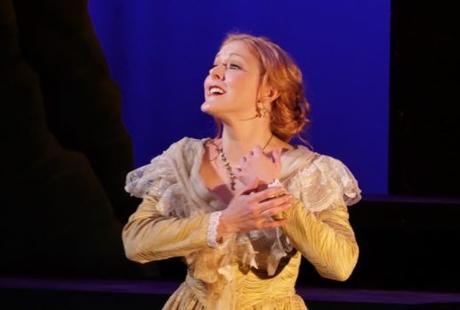
Looking for goats in all the wrong places: Jennifer Moore in Dinorah.
Photo © Amore Opera.
Giacomo Meyerbeer (birth name Jakob Wilhelm Beer) was the king of Paris grand opera in the middle of the 19th century. He would be eclipsed after his death by the rise of Wagner, thanks in part to that other composer's habit of attacking him and his work repeatedly in print. Today, Meyerbeer is not a household name, but he is recognized s a masterful orchestrator. His long, challenging and showy soprano arias have found favor with today's rising divas. And while you may not see a six hour Meyerbeer extravaganza at the Met, his works have enjoyed some revivals and even recordings in recent years.
Dinorah dates from 1859, and is set to a libretto by the composer himself. it was written for the Opera-Comique, the Paris theater that erved as the birthplace of Bizet's Carmen. This score is full of innovative touches: chorales of horns and winds, religious choruses that are sung a capella, and an utterly preposterous plot. Essentially, the title character gets a mad scene that lasts most of three acts. As she goes wandering in the mountains trying to find her little lost goat (played with adorable energy by Miss Carina Golden) she encounters her wayward fiancee Höel and the buffoonish bagpiper Corentin, themselves embroiled in a quest to retrieve a cursed treasure hidden in a spooky ravine.
The opening bars of the Overture showed the depths of Meyerbeer’s musical invention. Slithering violins skittered and scraped, creating a sense of unease. This was juxtaposed with a series of brass chorales and the entry of the chorus, aligned along the back wall of the small theater and singing the "Saint Marie" chorus, a nod to the Pilgrims Chorus in Wagner’s Tannhäuser. This grandiose opening set up the story that was to follow, which was simply and engagingly told against a progression of old-fashioned painted landscapes. It is the tale of a gormless girl who loses her fiancée, her marbles and her cute little pet goat and spends the rest of the opera trying to get them all back
Soprano Jennifer Moore did a stellar job meeting the steep requirements of the title role. This is a coloratura challenge, as the singer has to warble over a large orchestra and hit some stratospheric notes. Ms. Moore’s standout moment came in the “Shadow Aria” in the second act, where the girl sings a merry two-part waltz to her own shadow. The tricky but is that Meyerbeer asks for the shadow to respond in the same singers voice, but with a different musical inflection. She also sang beautifully in the latter pages of the very long part, maintaining a silver, gleaming sound in the arduous finale when Dinorah finally breaks the chains of madness and is reunited with Yöel.
The role of Corentin was sung by Michael Celentano, who had a fine comic stage presence and a robust voice. His is a a secondary comic role, confronting fears and phobias armed with a vacillating nature and an authentic looking set of bagpipes. The pipes were thankfully silent in the smallish theater, represented by oboe and English horn in the orchestra. The baritone part of Hõel, Dinorah's feckless fiancée does not become important until the second half of this three-act opera, He was played with flair by baritone Nobuki Momma. The duet-into-trio finale that brought down the curtain on Act II showed these three singers working together with gusto, as they vacillated over who would be unlucky enough to enter the treasure cave.
The supporting roles were well cast. Bass Gennady Vysotsky made the Hunter an appealing audience favorite. His Act III solo aria was supported by five interlocking French horn parts. As his counterpart the Harvester, tenor Steven Tompkins sang with pleasing tone. The introduction of these two figures marked a turn in the plot of this opera as Höel found his love for Dinorah and she got her memory back. The plot resolved with remarkable swiftness and Dinorah got her goat Bellah back. The opera ended with a sumptuous revival of the opening chorus, as the marriage of Höel and Dinorah finally commenced.
If you enjoyed this article, it's time to click over to Superconductor's Patreon page, and help support the cost of independent music journalism in New York City at the low cost of just $5/month.

